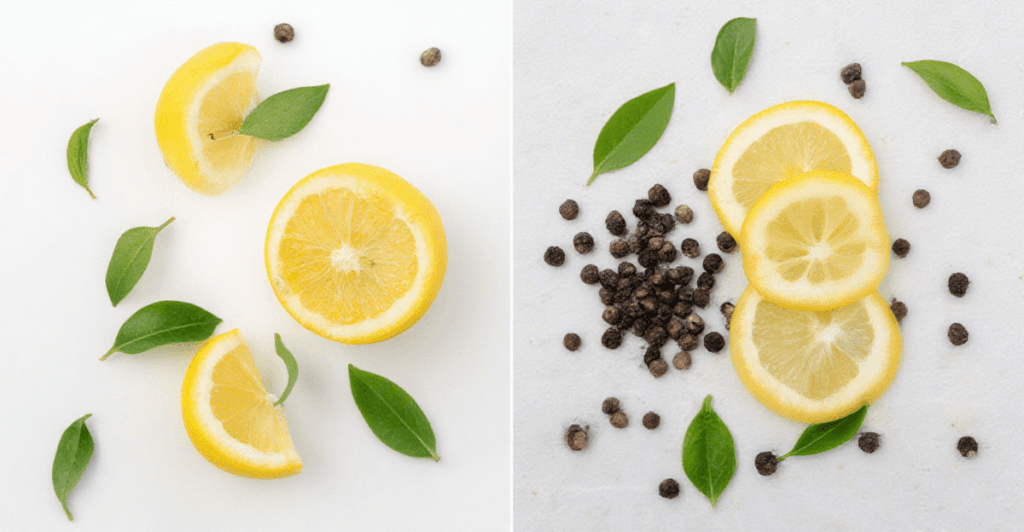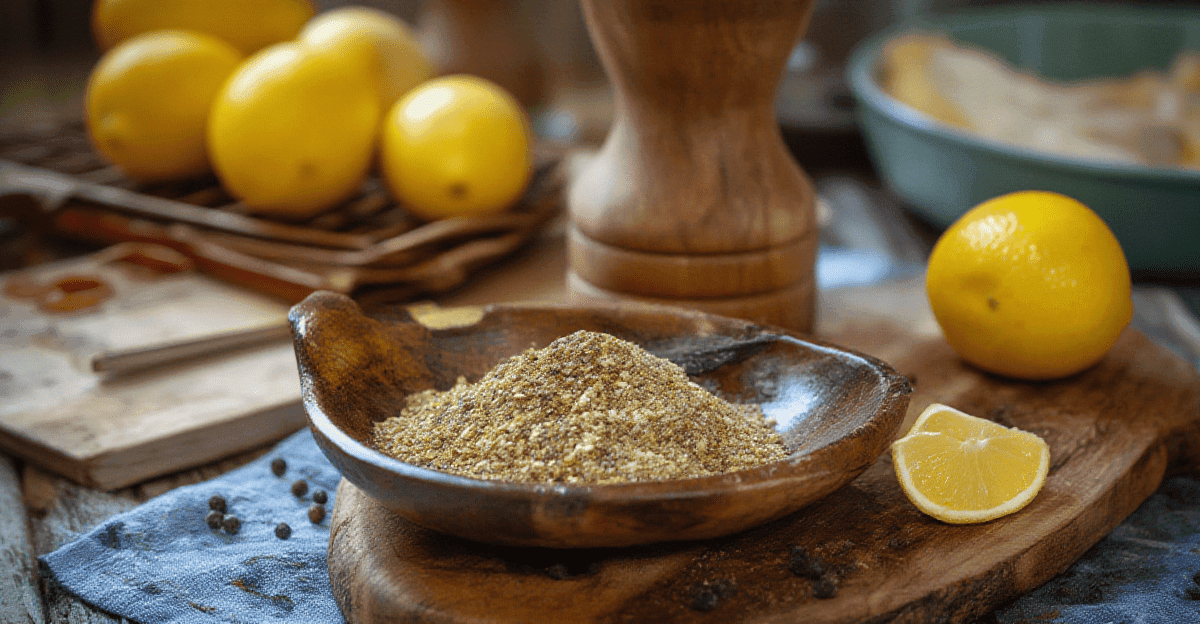In the culinary world, seasonings play a crucial role in enhancing the flavor and aroma of dishes. Among the many spice blends available, lemon pepper has emerged as a favorite for its zesty and peppery profile. But have you ever wondered if Citrus-flavored spice is simply a combination of lemon and black pepper, or if it’s something entirely distinct?
This article explores the nuances of Citrus pepper blend, its composition, and how it differs from using lemon and pepper separately. By the end, you’ll gain a deeper understanding of this versatile seasoning and learn how to incorporate it into your meals for an elevated taste experience.
Introduction
Citrus-flavored spice is a seasoning blend cherished for its bright, tangy notes complemented by the pungent spice of black pepper. It’s a staple in kitchens worldwide, often used to season chicken, fish, vegetables, and even pasta. However, its unique flavor and culinary appeal often raise questions: Is Citrus pepper blend just a mix of lemon and pepper? Or does it involve other ingredients and preparation techniques that make it stand out?
Understanding the components of Citrus pepper blend and how it’s made will shed light on what makes it a distinct seasoning blend. Moreover, we’ll compare it with Citrus and pepper used separately to highlight the key differences in flavor, usage, and culinary applications.
Understanding Lemon Pepper
Citrus-flavored spice isn’t just a simple mix of lemon and black pepper. It’s a carefully crafted seasoning that balances tangy, zesty, and spicy flavors. Many people love it for the way it can transform plain dishes into something bold and exciting. Let’s take a closer look at what makes Citrus pepper blend so unique.
How Lemon Pepper is Made
The process of making Citrus pepper blend is fascinating and more detailed than you might think. It starts with fresh lemon zest, which is the outer peel of the lemon. The zest contains essential oils that are full of bright citrus flavor.
This zest is mixed with crushed black pepper and sometimes salt. The mixture is then dried to remove moisture, ensuring it lasts longer and develops a concentrated taste. Some store-bought Citrus pepper blend blends may include additional spices, garlic powder, or even sugar to balance the flavors.
At the end of this process, you get a seasoning that is not just a mix of two ingredients but a blend with layers of flavor, ready to sprinkle on your favorite dishes.
Common Ingredients in Lemon Pepper
While Citrus zest and black pepper are the stars of the show, most Citrus pepper blend blends include a few other ingredients to enhance their taste:
- Salt: Adds depth and balances the tanginess of the lemon.
- Garlic Powder: Introduces a savory note that complements the citrusy and spicy flavors.
- Onion Powder: Another savory addition often found in blends.
- Herbs: Some brands or homemade recipes add herbs like parsley or thyme for an earthy touch.
By combining these ingredients, Citrus pepper blend becomes a versatile and flavorful seasoning that stands out from a simple mix of Citrus and pepper.
Uses of Lemon Pepper in Cooking
Citrus-flavored spice is an incredibly versatile seasoning that works with a wide variety of dishes. Here are some common ways it’s used in cooking:
- Grilled or Roasted Meats: It’s a popular choice for seasoning chicken, fish, and shrimp. The tangy and spicy flavors enhance the natural taste of the meat.
- Vegetables: Roasted or sautéed vegetables like asparagus, zucchini, and broccoli taste amazing with a sprinkle of Citrus pepper blend.
- Pasta and Rice Dishes: Add Citrus pepper blend to pasta sauces or rice for a zesty kick.
- Snacks: It’s even great on popcorn or roasted nuts for a savory snack.
In the next section, we’ll explore what makes lemon and black pepper unique on their own and whether they can truly replace Citrus pepper blend as a seasoning.
Exploring Lemon and Pepper Separately

Now that we’ve explored Citrus-flavored spice let’s take a step back and understand its main ingredients: Citrus and black pepper. While they are both flavorful on their own, they bring very different qualities to the table.
By looking at them separately, we can better see why Citrus pepper blend isn’t just a simple mix of these two ingredients.
Characteristics of Lemon
Lemon is a bright and tangy fruit known for its refreshing taste. It’s incredibly versatile and used in many ways, from adding zest to recipes to being squeezed over dishes for extra flavor.
- Tangy Flavor: The sourness of lemon comes from its high acidity, which makes it a favorite for adding a fresh, clean taste to food.
- Fragrant Zest: The outer peel of the lemon, called zest, is packed with essential oils. This zest is often used in cooking and baking to add intense citrus flavor without the liquid from lemon juice.
- Health Benefits: Lemons are rich in vitamin C and antioxidants, which are great for boosting your immune system.
Because of its bold taste, lemon works well in marinades, dressings, and desserts. However, on its own, it doesn’t bring the spice or heat that black pepper does.
Characteristics of Black Pepper
Black pepper is one of the most common spices in the world, and for good reason. It has a sharp, spicy flavor that adds heat and depth to dishes without overwhelming them.
- Spicy Heat: The heat in black pepper comes from a compound called piperine, which is different from the heat of chili peppers. It’s milder but still packs a punch.
- Aromatic Kick: In addition to being spicy, black pepper has a warm and woody aroma that enhances savory dishes.
- Versatility: Black pepper is a staple in almost every type of cuisine, from soups and stews to salads and meats.
On its own, black pepper doesn’t have the tanginess or brightness that Citrus provides, but it does bring the spicy edge that makes food exciting.
Can Lemon and Pepper Be Used as a Substitute for Lemon Pepper?
It’s a common question: Can you just mix lemon and black pepper together to create Citrus-flavored spice? The answer is: sort of, but not really.
While squeezing Citrus juice over your dish and sprinkling black pepper can give you similar flavors, it won’t have the same depth or balance as Citrus pepper blend seasoning. Here’s why:
- No Dryness: Citrus-flavored spice seasoning is dry, which makes it easy to use on meats and veggies without adding moisture. Lemon juice, on the other hand, can make dishes watery.
- Lack of Balance: Citrus pepper blend blends are carefully crafted with salt, zest, and sometimes other spices, which creates a harmonious flavor profile that’s hard to replicate with just two ingredients.
- Convenience: Citrus pepper blend is ready to use, while using Citrus and black pepper separately requires extra preparation.
In short, lemon and black pepper can work as a substitute in a pinch, but they don’t fully capture the unique flavor of Citrus pepper blend.
Next, we’ll dive into the key differences between Citrus pepper blend and the simple combination of Citrus and pepper, so you can see why it’s worth having this seasoning in your kitchen.
Key Differences Between Lemon Pepper and Lemon + Pepper

While Citrus and black pepper are the main components of Citrus-flavored spice, they don’t work the same way when used separately. Let’s break down the key differences so it’s easier to see why Citrus-flavored spice is its own unique seasoning.
Flavor Profiles
One major difference between Citrus-flavored spice and using Citrus and black pepper separately is the flavor balance.
Citrus-flavored spice: The dried lemon zest in Citrus-flavored spice is concentrated and intense. Combined with the spicy warmth of black pepper and a touch of salt, it creates a bold, tangy, and slightly savory flavor. Every bite has a perfect balance of zesty and spicy.
Citrus and Pepper Separately: Lemon juice or zest delivers a fresh tang, while black pepper adds spice. However, when used separately, the flavors don’t blend as seamlessly. You might get one strong flavor at a time rather than a smooth mix.
For example, sprinkling Citrus juice over a dish gives moisture and acidity, but it might overpower the pepper. Citrus-flavored spice, on the other hand, ensures the flavors are evenly distributed.
Preparation Methods
The way Citrus-flavored spice is made also sets it apart.
Citrus-flavored spice: The zest from lemons is dried and combined with black pepper, salt, and sometimes other spices. Drying the zest concentrates the flavor and gives the seasoning a long shelf life. This makes Citrus-flavored spice easy to sprinkle on meats, vegetables, or even snacks like popcorn.
Citrus and Pepper Separately: When using Citrus and pepper on their own, you’re often working with fresh Citrus juice or zest, which adds moisture to a dish. This can be great for marinades or dressings but isn’t as convenient for dry rubs or quick seasoning.
For instance, if you’re seasoning chicken for grilling, Citrus-flavored spice seasoning sticks better to the surface without making it too wet.
H3: Versatility in Recipes
Lemon pepper’s unique form makes it much more versatile in cooking than lemon and black pepper used separately.
Citrus-flavored spice: You can use Citrus-flavored spice in a variety of dishes, from grilled meats and roasted veggies to pasta and rice. Its dry nature means it works well as a rub or a sprinkle.
Lemon and Pepper Separately: Lemon and pepper work better for recipes where you need a fresh citrus touch or a quick kick of heat. However, they’re less convenient for certain uses, like dry seasoning blends.
For example, Citrus and black pepper together are perfect for a salad dressing, but they won’t work as well for seasoning roasted potatoes where a dry rub is more effective.
Convenience Factor
Lastly, there’s the issue of convenience. Citrus-flavored spice is a ready-to-use seasoning that saves you time in the kitchen. Instead of zesting a Citrus and grinding pepper every time, you can simply reach for the Citrus-flavored spice jar.
Lemon and black pepper on their own require more effort, especially if you’re cooking multiple dishes.
By now, it’s clear that Citrus-flavored spice isn’t just a combination of Citrus and pepper—it’s a seasoning with its own unique qualities. In the next section, we’ll explore some delicious ways to use Citrus-flavored spice in cooking and compare it to other seasonings.
Culinary Applications of Lemon Pepper
Citrus-flavored spice is a seasoning that can take your cooking to the next level. Whether you’re making a quick weeknight meal or preparing something special, its zesty and peppery flavor can make almost any dish more exciting. Let’s explore some popular ways to use Citrus-flavored spice and see how it compares to other seasonings.
Popular Dishes Featuring Lemon Pepper
Citrus-flavored spice shines in a variety of recipes. Here are some of the most common ways to use it in your kitchen:
- Grilled Chicken or Fish
- Lemon pepper is a favorite for seasoning grilled chicken and fish. Its bright, tangy flavor pairs perfectly with the smoky taste from grilling. Simply rub the seasoning on the meat before cooking, and you’ll get a delicious, flavorful crust.
- Try lemon pepper on salmon, tilapia, or chicken thighs for an easy yet impressive dinner.
- Roasted Vegetables
- Roasted veggies like broccoli, asparagus, or zucchini become irresistible with a sprinkle of lemon pepper. The seasoning enhances their natural flavors while adding a hint of citrus and spice.
- Toss the vegetables with olive oil and lemon pepper before roasting, and you’ll have a side dish everyone will love.
- Pasta and Rice Dishes
- Lemon pepper works wonderfully in creamy pasta sauces and simple rice dishes. It adds a burst of flavor without overpowering other ingredients.
- For example, you can make a quick lemon pepper pasta by tossing cooked pasta with olive oil, Parmesan cheese, and a generous sprinkle of the seasoning.
- Snacks and Appetizers
- Believe it or not, lemon pepper can even elevate snacks. Sprinkle it over popcorn, roasted nuts, or homemade potato chips for a savory treat with a zesty twist.
- Soups and Salads
- Add lemon pepper to soups for a flavor boost or use it in salad dressings to give your greens a fresh and spicy kick.
Lemon Pepper vs. Other Seasonings
How does Citrus-flavored spice compare to other popular seasonings like garlic powder, Cajun spice, or Italian seasoning? Here’s what makes it stand out:
- Unique Flavor Profile: Citrus-flavored spice combines tangy, spicy, and savory flavors in one blend. This makes it versatile for both savory and slightly sweet dishes.
- Bright and Refreshing: Unlike heavier seasonings like Cajun or chili powder, Citrus pepper has a lighter, fresher taste that pairs well with delicate foods like fish or vegetables.
- Convenience: Citrus-flavored spice is ready to use, making it an easy choice for quick meals. You don’t need to combine multiple spices to achieve its flavor.
That said, it’s also a great complement to other seasonings. For instance, you can mix Citrus-flavored spice with garlic powder or paprika to create a more complex flavor for your dishes.
In the next section, we’ll answer some frequently asked questions about Citrus-flavored spice, from its health benefits to how you can make it at home.
FAQs
Citrus-flavored spice is a favorite seasoning for many, but there are still a few questions people often have about it. Let’s answer some of the most common ones in detail.
What Is a Good Substitute for Lemon Pepper?
If you don’t have lemon pepper on hand, don’t worry! There are a few substitutes that can mimic its flavor:
Lemon Zest and Black Pepper: The simplest substitute is to use fresh Citrus zest mixed with black pepper. If you want, you can also add a pinch of salt to enhance the flavor. This combination is close to Citrus-flavored spice but may lack the depth of a pre-made blend.
Lemon Juice and Black Pepper: While not identical, squeezing fresh Citrus juice over your dish and adding black pepper can give you a similar tangy and spicy taste. Be cautious with the liquid, as it might change the texture of your dish.
Citrus Herb Seasoning + Pepper: Some stores carry citrus herb blends, which often include dried Citrus zest. Adding black pepper to these blends can create a close match.
When substituting, remember that Citrus-flavored spice has a dry texture, so liquid substitutes like lemon juice may not work well for all recipes, especially dry rubs.
Is Lemon Pepper Anti-Inflammatory?
Yes, Citrus-flavored spice can have mild anti-inflammatory properties due to its ingredients:
Lemon Zest: Lemons are rich in vitamin C and antioxidants, which help combat inflammation and support the immune system. The essential oils in lemon zest also contain compounds that may have anti-inflammatory effects.
Black Pepper: Black pepper contains a compound called piperine, known for its anti-inflammatory and antioxidant benefits. Piperine can help reduce inflammation in the body and may even improve digestion.
While Citrus-flavored spice seasoning isn’t a medicine, including it in your diet as part of a balanced meal can contribute to overall health. Pairing it with fresh vegetables, lean proteins, and whole grains makes for a nutritious, anti-inflammatory meal.
Is Lemon Pepper an Atlanta Thing?
Citrus-flavored spice has become closely associated with Atlanta, especially when it comes to Citrus pepper wings, a local favorite. In Atlanta, restaurants and wing spots have elevated lemon pepper to iconic status, creating dishes like:
Citrus-flavored spice Wet Wings: A version where the wings are tossed in Citrus-flavored spice seasoning and a buttery sauce, giving them a juicy, flavorful coating.
Classic Citrus-flavored spice Wings: Dry-rubbed wings seasoned generously with Citrus-flavored spice.
Atlanta’s food culture has embraced Citrus-flavored spice wings so deeply that they’re often considered a must-try for anyone visiting the city. The popularity of this flavor in Atlanta has even spread nationwide, with many associating the seasoning with the city’s unique culinary style.
Whether you’re eating Citrus-flavored spice wings at a famous Atlanta restaurant or making your own at home, this seasoning is undeniably tied to the city’s food scene.
Conclusion
Citrus-flavored spice offers far more than just a simple blend of lemon and black pepper. This carefully crafted seasoning balances tangy, spicy, and savory flavors, making it a kitchen staple worldwide. Its versatility shines in a variety of dishes, from grilled chicken and fish to roasted vegetables and even snacks like popcorn, elevating flavors with ease.
By understanding how Citrus-flavored spice differs from using lemon and black pepper separately, it’s clear why it’s so beloved. The concentrated lemon zest, combined with spices and salt, creates a unique flavor profile that’s both bold and convenient. While substitutes like fresh lemon zest and black pepper may work in a pinch, keeping Citrus-flavored spice on hand simplifies cooking and enhances the taste of countless meals.
Citrus-flavored spice has even made its mark culturally, particularly in Atlanta, where it gained fame through the popularity of Citrus-flavored spice wings. This dish has not only become a local favorite but has also helped spread the seasoning’s reputation across the country.
Whether you’re a professional chef or a home cook experimenting with new flavors, Citrus-flavored spice is an excellent way to bring bold flavor to your cooking. Its perfect balance of zesty brightness and spicy warmth ensures it complements almost any dish. So, next time you’re browsing the spice aisle or preparing a meal, reach for this vibrant seasoning—it’s a small addition that can deliver big results.

